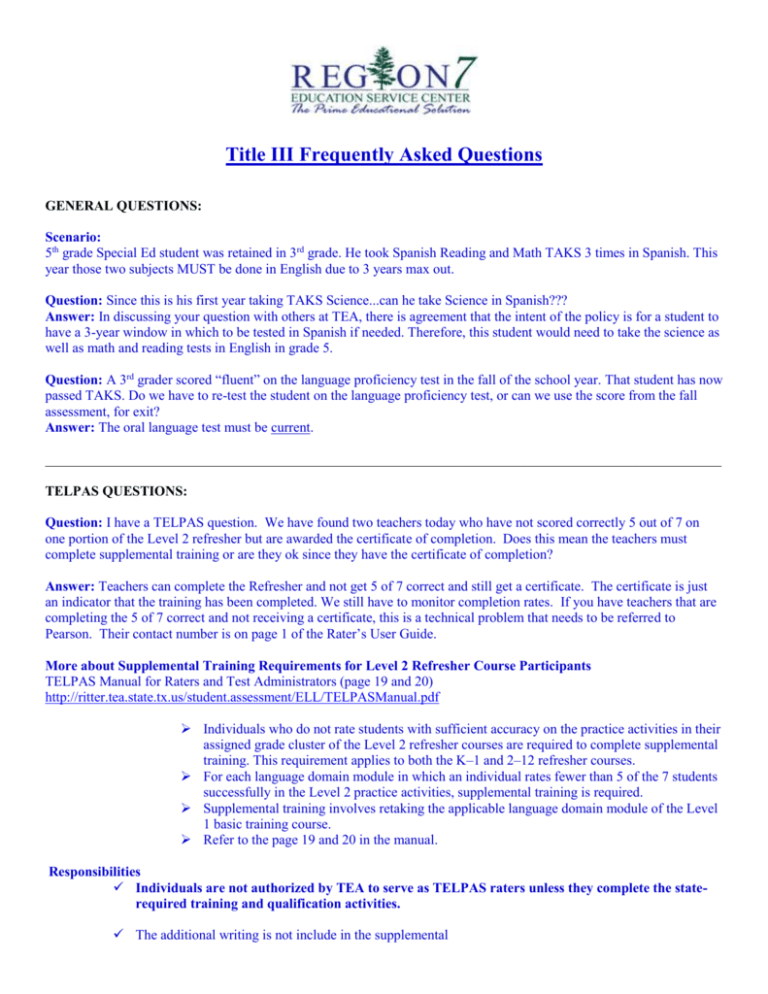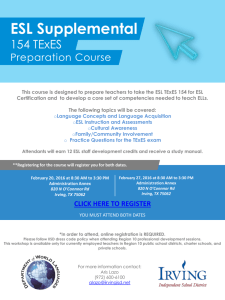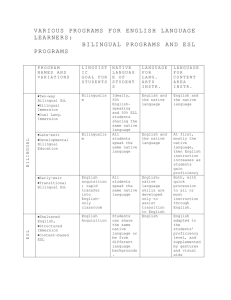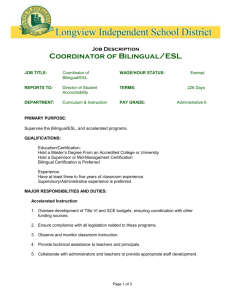Title III Frequently Asked Questions GENERAL QUESTIONS
advertisement

Title III Frequently Asked Questions GENERAL QUESTIONS: Scenario: 5th grade Special Ed student was retained in 3rd grade. He took Spanish Reading and Math TAKS 3 times in Spanish. This year those two subjects MUST be done in English due to 3 years max out. Question: Since this is his first year taking TAKS Science...can he take Science in Spanish??? Answer: In discussing your question with others at TEA, there is agreement that the intent of the policy is for a student to have a 3-year window in which to be tested in Spanish if needed. Therefore, this student would need to take the science as well as math and reading tests in English in grade 5. Question: A 3rd grader scored “fluent” on the language proficiency test in the fall of the school year. That student has now passed TAKS. Do we have to re-test the student on the language proficiency test, or can we use the score from the fall assessment, for exit? Answer: The oral language test must be current. __________________________________________________________________________________________________ TELPAS QUESTIONS: Question: I have a TELPAS question. We have found two teachers today who have not scored correctly 5 out of 7 on one portion of the Level 2 refresher but are awarded the certificate of completion. Does this mean the teachers must complete supplemental training or are they ok since they have the certificate of completion? Answer: Teachers can complete the Refresher and not get 5 of 7 correct and still get a certificate. The certificate is just an indicator that the training has been completed. We still have to monitor completion rates. If you have teachers that are completing the 5 of 7 correct and not receiving a certificate, this is a technical problem that needs to be referred to Pearson. Their contact number is on page 1 of the Rater’s User Guide. More about Supplemental Training Requirements for Level 2 Refresher Course Participants TELPAS Manual for Raters and Test Administrators (page 19 and 20) http://ritter.tea.state.tx.us/student.assessment/ELL/TELPASManual.pdf Individuals who do not rate students with sufficient accuracy on the practice activities in their assigned grade cluster of the Level 2 refresher courses are required to complete supplemental training. This requirement applies to both the K–1 and 2–12 refresher courses. For each language domain module in which an individual rates fewer than 5 of the 7 students successfully in the Level 2 practice activities, supplemental training is required. Supplemental training involves retaking the applicable language domain module of the Level 1 basic training course. Refer to the page 19 and 20 in the manual. Responsibilities Individuals are not authorized by TEA to serve as TELPAS raters unless they complete the staterequired training and qualification activities. The additional writing is not include in the supplemental Careful with Confusion between Supplemental Training and Additional Writing Practice Modules Level 2 refresher for grades 2–12 contains additional writing practice module that raters may complete by mistake thinking it is supplemental training Raters are advised to follow instructions in TELPAS Manual and online course to avoid confusion Individuals Not Successful on Supplemental Training Districts are responsible for ensuring validity and reliability of rating process. Recommendations: • • • Do not use rater Use rater with rating support Have rater do additional review and based on that make decision about whether additional rating support needed during live assessment Campus Coordinator Activity 6, page 262 __________________________________________________________________________________________________ Question: Can a student use a computer/word processor to write his collections, for TELPAS assessment? Answer: YES, as long as the student does not use “spell check” or “grammar check”. Also we have three possible options for his writing collection. Please advise as to which would or would not be allowable. He is using all three response modes during classroom instruction. type his essays on the computer using ZOOMTEXT ---This is admissible as long as the student does not use “spell check” or “grammar check” type on his Braille writer and have someone transcribe ---this is admissible as long as “EVERY” word is written down he dictate those and let someone scribe them for him---this is admissible as long as “EVERY” word is written down __________________________________________________________________________________________________ CERTIFICATION QUESTIONS: 1. How can I get ESL certification? a. Currently certified teacher: Pass the ESL TExES test #154. This adds ESL certification to all levels you are already certified to teach. b. Not a certified teacher: Check with the institution through which you are working toward certification. 2. Which test do I take? Certified teachers should take TExES test #154 which is a half day test. ESL Generalist EC-4 #104 and ESL Generalist 48 #120 are full day tests meant for those who do not have their initial certification. 3. When is the test given? TExES tests are given six times throughout the school year. Schedule for the new school year is released in August. 4. How do I register for the test? Information about online and mail registration can be found at www.texes.ets.org. Registration deadline is usually about 5 weeks before the test date. 5. Where can I find study materials for the test? The TExES Preparation Manuals, the state study guides for all TExES tests, are available online at www.texes.nesinc.com. 6. What other test preparation assistance is available? The Region 7, Title III Bilingual/ESL Program offers a preparation session for the 154 English as a Second Language Supplemental (ESL) exam. During this two-day workshop, participants receive a comprehensive overview of theories, research, and current practices in the second language acquisition process and will learn the stages of literacy development in order to adapt and design instruction to meet the needs of ELLs. 7. When is the prep course offered and how do I register? Details on dates and locations can be found on the Bilingual/ESL homepage. http://www.esc7.net/default.aspx?name=BilingualESL 8. Is there a charge for the prep course? $0.00 for members of Title III Bilingual /ESL Contracted $0.00 for members of Title III Bilingual/ESL SSA $265.00 Standard Fee __________________________________________________________________________________________________ FUNDING QUESTIONS: Question: Can a district pay the salaries of bilingual and ESL teachers that teach during the course of the school year and/or summer school out of the Bilingual allotment? Answer: No. Districts may not use their BEA for teacher salaries. Question: Is it permissible to use the BEA to pay for the district’s bilingual director? Answer: No. Question: Can State Bilingual funds be used to purchase school supplies for summer school (i.e. pencils, crayons, etc.)? Answer: Provided that the district can demonstrate that the use of state BEA funds for school supplies is required for quality instruction, yes. Questions: Can a school district use Title III Funds to pay stipends to Bilingual or ESL teachers as a bonus for hiring with your district? Answer: No. The district should use its Bilingual Education Allotment instead of Title III funds to pay for the stipends to teachers certified in a Bilingual Education area. This is an allowable use of state funds pursuant to TEC 42.153(c) (supplements for teachers). Question: If a district is having a parent night and wants to do something “above and beyond” for the parents of their English Language Learners, can the district pay paraprofessionals to work with these parents during that event? Answer: Although Sec. 3102(6) and Sec. 3115(d)(6)(B) of P.L. 107-110 authorize the district to use Title III, Part A funds for activities that “assist parents in helping their children to improve their academic achievement and becoming active participants in the education of their children”, the district must first use its Title III, Part A funds to implement the required activities stipulated in Sec. 3115(c). Given this stipulation, the district may opt to use its Bilingual Education Allotment instead of Title III, Part A funds to pay educational aides to work with parents of students enrolled in the district’s Bilingual Education/ESL program. This is an allowable use of state funds pursuant to TEC 42.153(c) (supplemental staff expenses).




